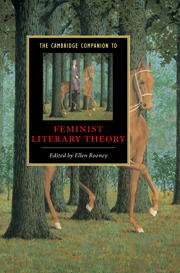Book contents
- Frontmatter
- Introduction
- Part 1 Problematics emerge
- Part 2 In feminism’s wake: genre, period, form
- 4 What feminism did to novel studies
- 5 Autobiography and the feminist subject
- 6 Modernisms and feminisms
- 7 French feminism’s écriture féminine
- 8 Feminism and popular culture
- Part 3 Feminist theories in play
- Index
5 - Autobiography and the feminist subject
from Part 2 - In feminism’s wake: genre, period, form
Published online by Cambridge University Press: 28 November 2006
- Frontmatter
- Introduction
- Part 1 Problematics emerge
- Part 2 In feminism’s wake: genre, period, form
- 4 What feminism did to novel studies
- 5 Autobiography and the feminist subject
- 6 Modernisms and feminisms
- 7 French feminism’s écriture féminine
- 8 Feminism and popular culture
- Part 3 Feminist theories in play
- Index
Summary
“I am not fully known to myself, because part of what I am is the enigmatic traces of others.”
– Judith Butler, Precarious Life (2004)The subject of autobiography
Feminism has had an almost symbiotic relationship with autobiography, which has often acted as the shadow and locus for its evolving debates about the subject. However, autobiography has not always been completely passive and has had questions of its own to ask of feminism, often to do with specificity and the need to find room, inside or outside theory, for difference and the disconcerting diversity of texts and writing subjects. If we go back to the early stages of their relationship, we can see how in the 1960s and 1970s, as second-wave feminism flourished, autobiography seemed to provide a privileged space for women to discover new forms of subjectivity, both through the reading of autobiographical writing by women, historical as well as contemporary, and through the production of texts which explored the female subject in franker, less constricted or more inventive ways. Later, however, as poststructuralist theory began to transform feminist thinking, autobiography became the site for major theoretical debates about the subject. Toward the end of the 1970s, therefore, the notion of a female selfhood which could be triumphantly liberated from its neglect or repression under patriarchy and made visible through writing was put into question by psychoanalytic and poststructuralist thinking which instead insisted that the subject did not preexist the process of its formation within language, and that all identities, including gendered identities, are never fully realized but instead a story of repeated failures to achieve fullness or closure.
- Type
- Chapter
- Information
- The Cambridge Companion to Feminist Literary Theory , pp. 119 - 135Publisher: Cambridge University PressPrint publication year: 2006
- 4
- Cited by



